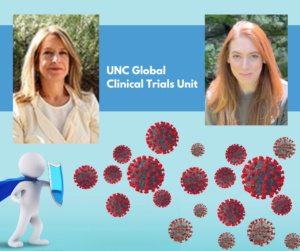
The Institute for Global Health and Infectious Disease’s Global Clinical Trials Unit attracts leading trials from national feeder networks to study treatment innovations that can advance health. A new HIV study with the ACTG will evaluate the safety, tolerability, and antiviral effect of a novel combination regimen that includes therapeutic T-cell vaccines, two broadly neutralizing antibodies (bNAbs), and an immune-system boosting treatment among people living with HIV who started antiretroviral treatment (ART) during acute (early) HIV infection.
Known as the “Triple Immune Strategy for HIV Remission” (A5374), the study is a multi-site, randomized, placebo-controlled trial. Researchers hypothesize that this combination regimen will result in a longer period of viral control during a closely monitored pause in ART, compared to placebo.
Cindy Gay, MD, MPH, serves as protocol leader, acting as co-vice chair at the network level and the local principal investigator for the trial, and Hannah Thaxton is the study coordinator. Joe Eron, MD, is the vice-chair of the ACTG Network.
“We expect that a combination of novel treatments will be needed to decrease the number of cells harboring HIV, and simultaneously stimulate the immune system to keep the virus from replicating,” said Gay, associate professor of infectious diseases and medical director of the UNC HIV CURE Center.
“While current ART can manage HIV very well, it does not remove HIV from the body, and people living with HIV have to take it for the rest of their lives in order to suppress viral replication and protect their immune systems. The approach being studied in the A5374 trial is part of a potential path toward enabling the immune system to manage HIV in the absence of ART for weeks or months.”
The trial will enroll 45 participants aged 18 years and older who started combination ART within 28 days of acute HIV diagnosis (30 who will receive active study treatment and 15 who will receive placebo). The study will last up to approximately two years for each participant.
After enrollment, participants will continue taking their HIV medications and receive either a series of novel treatments or placebo. After about 16 months in the study, participants will stop taking ART. They will be closely monitored for increases in HIV viral load, decreases in CD4 T-cell counts, and symptoms, and will resume taking ART if indicated or if they become pregnant. The study will compare the length of time that participants in the active treatment and placebo groups experience viral control while they are off ART.
Carefully monitored analytic treatment interruptions are an important part of HIV cure clinical trials. They can help determine whether a research intervention can reduce latent HIV (HIV that is “hidden” in different cells and tissues but not replicating) or increase immune function.
Sponsored by the NIH’s National Institute of Allergy and Infectious Diseases (NIAID), the study will take place at up to 10 sites in the U.S. and Brazil, with support from the University of Oxford and Gilead Sciences.
Any provider who would like to refer a participant should contact hannah_thaxton@med.unc.edu. Find more information about the trial, here.
About the Global Clinical Trials Unit
The UNC Global Clinical Trials Unit (CTU), also known as the Global HIV Prevention and Treatment Clinical Trials Unit, operates through the Institute for Global Health and Infectious Diseases. Established in 1987 and continuously funded ever since, the CTU facilitates high-quality clinical research dedicated to HIV prevention and therapy research. When the pandemic began in 2020, the CTU’s built-in infrastructure for research excellence and UNC’s reputation attracted the Moderna and Novavax trials, and it continues to bring leading trials to Chapel Hill.
About ACTG
The ACTG (Advancing Clinical Therapeutics Globally) is the world’s largest and longest running clinical trials network focused on HIV and other infectious diseases and the people living with them. It is funded by NIAID and collaborating NIH Institutes. Founded in 1987, ACTG conducts research to improve the management of HIV and its comorbidities; develop a cure for HIV; and innovate treatments for tuberculosis, hepatitis B, and emerging infectious diseases. It comprises thousands of dedicated researchers, staff, and community members who are pursuing research into novel treatments and cures for infectious diseases at 65 locations across four continents, with the ultimate goal of advancing science that meaningfully impacts the lives of the people we serve.
